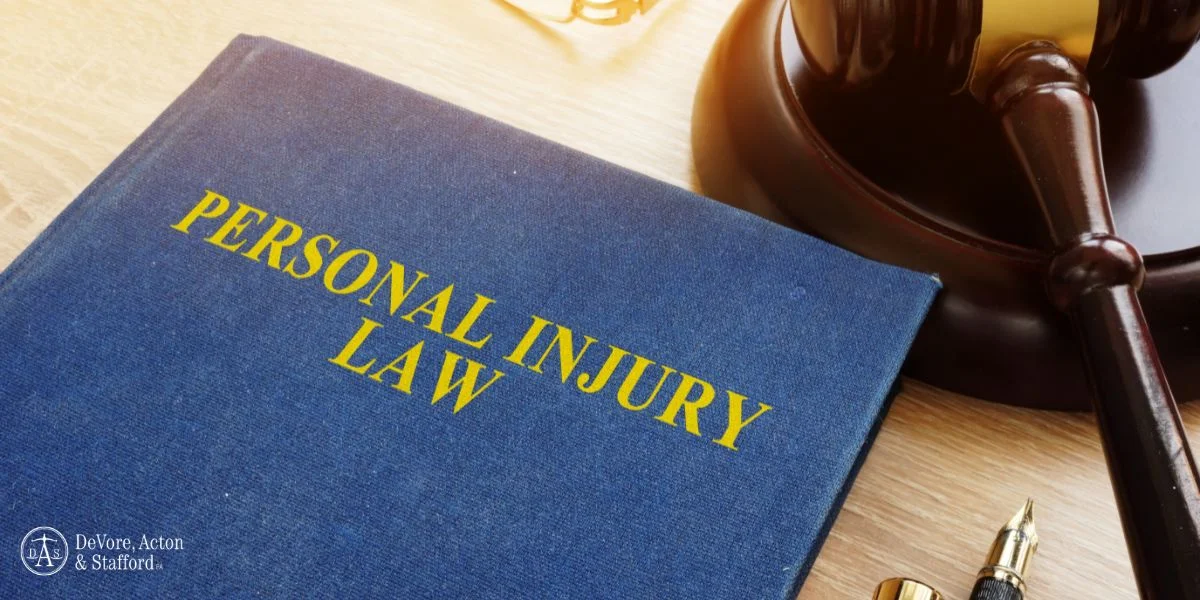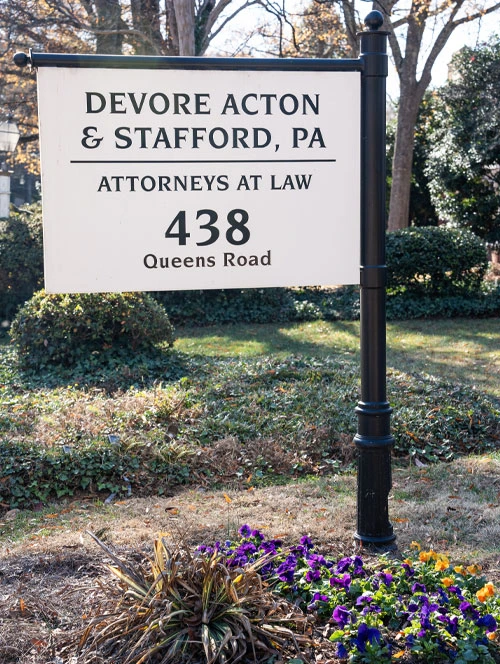Charlotte Personal Injury Lawyer
Charlotte Personal Injury Attorney
Our Charlotte personal injury lawyers deliver superior legal representation to injured clients throughout North Carolina. Clients and referring lawyers turn to our firm especially when they want legal advice with respect to wrongful death and catastrophic injury cases. If you have suffered a personal injury, a Charlotte personal injury lawyer can help.
Our firm’s attorneys hold more than 100 years of combined experience. We draw on this experience every day when protecting our clients’ rights and helping them seek justice for the injuries they have suffered.

Personalized Legal Representation
We practice a hands-on style of law that has enabled us to recover many successful results for our clients. We attend to our clients’ individual needs and tailor our legal representation to their personal circumstances.
In doing so, we apply our seasoned legal judgment to a wide variety of injury matters. Clients have sought our representation in cases involving all aspects of personal injuries. We can help you review your case and determine who the liable party is, and help you pursue the compensation you deserve for your injuries. Whether you received an injury as a result of property neglect, a reckless driver, or even through healthcare neglect, we can help take on big insurance companies to fight for the compensation you deserve.
Seasoned legal judgment means we understand the law as it currently stands as well as how it changes and develops. We provide our clients legal advice that takes into account the most recent changes and emerging trends in the law.
Seasoned legal judgment also means that we understand how the law is practiced in our community. We regularly advise our clients with respect to which strategies and arguments will work best depending on which judges may be hearing their cases, who may be serving as opposing counsel and even what insurance adjuster might be assigned to their claim.
What Is a Personal Injury?
A personal injury refers to an injury inflicted on a person due to another person’s negligence, intentional actions, or liability. With personal injuries, the affected individual is allowed to file a claim to seek compensation for the damages that result from their injuries.
Common Types of Personal Injury Cases
Personal injuries cover a range of incidents. Some of these include:
- Slip and fall. A slip and fall occurs on someone else’s property due to the negligence of that party, such as a slippery floor (especially in instances where the establishment has failed to notify the public of the hazard, such as through the use of a wet floor sign). Injuries that can occur from a slip and fall include fractures, sprained muscles, concussions, and back injuries.
- Vehicle accidents. Personal injuries can occur if a driver is negligent while operating a car, motorcycle, truck, or some other motor vehicle. A person could be considered negligent if they were driving while distracted or disregarded traffic rules. Injuries that can happen from vehicle accidents include whiplash, broken bones, traumatic brain injuries, and spinal injuries.
- Medical malpractice. Medical malpractice occurs when a medical professional fails to exercise the proper amount of care. This could be giving improper dosages of anesthesia or prescribing the wrong medication. Errors that can result in medical malpractice include surgical errors, birth defects, and misdiagnosis.
- Accidents at work. Accidents at work can happen with equipment or through other means. It is considered negligence if the injury happened through the fault of the employer, such as having faulty safety measures in place. Injuries that can occur due to workplace accidents include strained injuries (such as carpal tunnel syndrome), exposure to hazardous materials, falls, burns, and accidents with machinery.
- Dog bites. If a person is bitten by another person’s dog, there is a high chance that they would legally be held responsible for damages if the person is injured. Injuries that can result from dog bites include infections, puncture wounds, and even emotional trauma, especially if the bite happened to a child.
- Assault and battery. This happens when someone is injured as a result of intentional violence inflicted on the victim. Injuries from assault and battery include bruises, cuts, broken bones, internal injuries, and emotional trauma.
- Product liability. This occurs when someone is injured due to faulty products. Faulty products can happen with defective machinery, automobiles, household appliances, toys, electronics, and other equipment. Injuries that can occur from product liability include choking hazards, cuts, amputations, whiplash, burns, carbon monoxide poisoning, infections, allergic reactions, skin irritations, and electric shocks.
Fault in a Personal Injury Case in North Carolina
In most personal injury claims in Charlotte, one of the first things that both sides will argue is who is at fault in the incident. Many states will award damages based on the percentage that the offending party was at fault if the injured party was also partially at fault. However, North Carolina does not follow this rule.
North Carolina is a pure contributory negligence state. This means that, even if the injured party is as little as 1% at fault, they will not be permitted to seek damages for their injuries.
Common Defenses in a Personal Injury Case
Because North Carolina is one of a few states that is a contributory negligence state, the defenses available to a defendant are significant. Some of these defenses include:
- Contributory negligence. The defense can argue that the victim was at least partially at fault for their injuries. Because North Carolina is a contributory negligence state, the defense only has to prove a small amount of fault to completely avoid liability.
- Assumption of risk. The defense can argue that the plaintiff was aware of the risk that came with the situation. For example, if the plaintiff engaged in a high-risk sport and got injured, the defendant can claim that the plaintiff was aware of these risks.
- Pre-existing condition. The defense may argue that the plaintiff had a pre-existing condition. Thus, the injuries were a result of that medical condition and not the injuries.
- Statute of limitations. In some cases, the statute of limitations may have expired. In North Carolina, the statute of limitations for personal injury cases is three years from the date of the injury.
- Causation. The defendant may argue that the plaintiff’s injuries weren’t a direct result of the defendant’s actions. They may argue that the injuries were a result of a separate circumstance or unrelated event.
- Self-defense. In assault and battery cases and other cases involving physical altercations, a defendant may argue that they acted in self-defense, the defense of others, or the defense of their property. Their argument would state that their actions were necessary to avoid harm to themselves or others.
- No breach of duty. The defendant may argue that they did not breach their duty, claiming that they acted responsibly and with the proper amount of care.
North Carolina Statute of Limitations
North Carolina’s statute of limitations provides the timeframe for filing personal injury claims. This is primarily governed by a three-year general rule. This rule typically applies to various incidents, including motor vehicle accidents, premises liability, product liability, and animal attacks.
The state also adopts a “discovery rule,” initiating the clock from the date when the injury becomes or should have become apparent, allowing for flexibility in cases where injuries are not immediately evident.
North Carolina also imposes statutes of repose, which places a limit on the time to file a claim, often ten years from the defendant’s last harmful act. Specific limitations exist for intentional torts, like assault and battery, false imprisonment, and defamation of character. A person can seek an extension for filing a claim under certain circumstances, such as the defendant’s absence or the injured person being legally disabled or a minor.
Missing the statute of limitations deadline causes the case to be unviable. This makes it vital to seek prompt legal action and adhere to all requirements.
Filing a Personal Injury Claim in North Carolina
Filing a personal injury claim in North Carolina involves several steps to ensure that the case is properly processed. First, the plaintiff gathers evidence to support their claim. This can include documentation of the accident or incident, such as photographs, witness statements, medical records detailing their injuries, and communication with insurance companies or other parties involved.
Next, they will need to determine the appropriate venue for filing their claim. This will depend on the dollar amount of damages being sought and the location of the plaintiff. An attorney can assist with filing the paperwork and submitting it to the proper court.
Then, the plaintiff can file a complaint that outlines the details of the case, including the nature of the injury, the circumstances surrounding the incident, and the damages they are seeking. This document begins the claim process and must be filed within the statute of limitations, which is three years in North Carolina.
After the complaint is filed, the defendant will be served with a copy of the complaint, notifying them of the claim and their obligation to respond. The defendant has a designated period to file an answer, where they can admit or deny the allegations in the complaint and may assert any affirmative defenses.
Throughout the legal process, it’s critical to follow procedural rules and deadlines, gather any additional necessary evidence, and participate in any settlement negotiations or alternative dispute resolution processes that may arise.
Compensation for Personal Injuries
With personal injuries, there are a number of damages that a person can claim. A claimant can seek economic damages, which are meant to compensate for financial losses incurred due to the injury. Some of these include:
- Medical expenses. These include the cost of surgeries, hospital stays, medical treatments, and doctor visits. This can also include the cost of future treatment, such as rehabilitation and physical therapy. Medical expenses also cover expenses beyond being physically in the hospital, such as those for prescriptions and medical equipment.
- Lost wages. This includes costs associated with any time you missed work and were not compensated for it. It also includes loss of future wages if your injuries have caused you to be unable to perform your job as before. This is common in cases of permanent disability.
- Property damage. If any damage was done to your property, you have the right to file a claim to receive compensation for it. An example of this would be if you were in a car accident and sought compensation to repair the damage done to your car during the crash.
- Additional expenses. These include transportation costs to and from appointments or any modifications you have to make to your life as a result of your injuries, such as installing a wheelchair-accessible ramp.
A person can also seek non-economic damages. Non-economic damages are not as easy to quantify as they are more subjective. Some of these include:
- Pain and suffering. This refers to compensation given to an individual for the physical pain and discomfort they endured as a result of the injury.
- Emotional distress. This can include the psychological effects of the injury, such as PTSD, anxiety, stress, and depression.
- Loss of enjoyment of life. This is often used in cases where a person suffers a long-term or permanent disability and they are not able to enjoy life in the same way they used to. This includes certain activities and hobbies they used to be able to enjoy but can no longer do so due to the injury.
- Loss of consortium. This refers to the losses incurred as it relates to the victim’s relationships. This can include loss of intimacy or loss of companionship.
In some cases, a person can seek punitive damages, which are meant to punish the defendant and deter similar instances from happening again. However, these damages are less common. A defendant may also be ordered to pay the victim’s legal fees.
Personal Injury Lawyer FAQs
Q: What Percentage Do Most Personal Injury Lawyers Take?
A: Many personal injury lawyers work on a contingency basis. This means that they only charge a fee if the case is won, and their fee will be a percentage of the damages. However, the exact percentage will depend on the complexity of the case and the agreement you have with your lawyer.
Q: For a Personal Injury Case in North Carolina, How Long Does It Take to Settle It?
A: The amount of time it takes to settle a personal injury case in North Carolina will depend on a number of factors. Because every case is unique, with its own set of circumstances, the amount of time the case takes will depend on the details surrounding it. Factors that contribute to the timeline of the case include the court’s caseload, the severity of the victim’s injuries, the willingness of both sides to negotiate, and disputes over liability.
Q: What Is the Statute of Limitations for Personal Injury in North Carolina?
A: The statute of limitations for personal injury in North Carolina is three years from the date of the injury. This means that the injured person must file a claim within three years of being injured to seek damages. If a person files a claim after this timeframe, they will typically be denied the ability to seek damages. There are exceptions to this rule, such as injuries that were inflicted on minors or cases where the injury wasn’t discovered until much later.
Q: What Is Personal Injury in North Carolina?
A: In North Carolina, personal injury refers to the physical or psychological harm inflicted upon a person due to the negligence or intentional acts of another person. The victim can seek damages for their injuries by filing a claim with the court. Common personal injuries include slips and falls, medical malpractice, and vehicle accidents.
Making Informed Decisions Based On The Law And The Facts
At DAS Law Group, P.A., we believe in helping people seek compensation for the injuries that they incurred due to the reckless or negligent actions of others. If you were injured in an accident that was not your fault, you should not have to pay for the harm that was done to you.
We invite potential clients to schedule an initial consult by calling us at 704-377-5242. We can also be reached online. All communications remain confidential.

request your consultation
"*" indicates required fields


